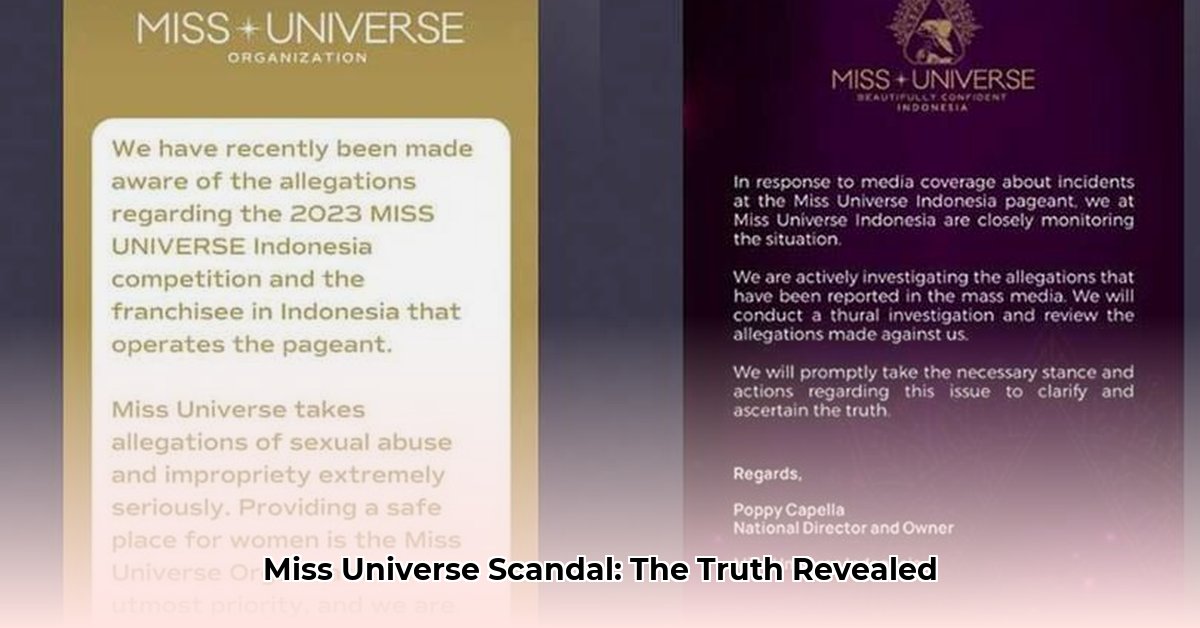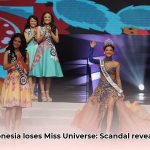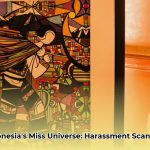The Miss Universe Organization (MUO), a long-standing symbol of beauty and empowerment, is currently navigating a complex crisis. Accusations of sexual harassment, discrimination, and a toxic work environment have cast a shadow over the organization, demanding a comprehensive and transparent response. This article provides an in-depth analysis of the situation, comparing the MUO’s official statements with firsthand accounts from former employees, titleholders, and other stakeholders. We will dissect the allegations, explore the potential legal and ethical ramifications, and propose actionable strategies for the MUO to regain trust and ensure a sustainable future. Our goal is to offer a balanced perspective, highlighting areas where the MUO can demonstrate genuine reform and prevent future issues. For more on recent franchise issues, see the details on the [Miss Universe Indonesia controversy](https://www.lolaapp.com/miss-universe-indonesia-2023-controversy-explained).
Addressing Allegations and Restoring Faith in the Miss Universe Brand
The Miss Universe Organization (MUO) is facing a critical test, confronting serious accusations of fostering a workplace marred by sexual harassment, discrimination, and overall toxicity. These charges, stemming from voices within the organization’s past – contestants, employees, and titleholders – sharply contrast with the glamorous facade the MUO has cultivated over decades. While the MUO has issued strong denials, dismissing the allegations as a smear campaign orchestrated to damage its reputation, the persistence and consistency of these accounts demand closer scrutiny and a more proactive response. What are the key issues at stake, and how can the MUO effectively address them to restore faith in its brand?
Examining Conflicting Narratives and Workplace Culture Dynamics
The MUO’s official statements, consistently disseminated through press releases and its website, steadfastly deny any wrongdoing and reaffirm its commitment to fostering a respectful and inclusive workplace. However, this narrative clashes starkly with numerous firsthand accounts detailing alleged incidents of sexual harassment, discriminatory behavior, and a culture of fear and intimidation. Some accounts even include supporting evidence such as screenshots and recorded conversations. While specific details may vary, the consistency of these stories paints a concerning picture and creates a significant credibility gap. Is the MUO prioritizing its image management over acknowledging and addressing legitimate concerns raised by individuals who experienced the organization firsthand?
The Indonesia Controversy: A Case of Franchise Management and Ethical Oversight
The abrupt cancellation of the Miss Universe Indonesia competition, despite a winner already being crowned, further intensifies scrutiny of the MUO’s oversight and quality control measures across its international franchises. This incident raises questions about the organization’s ability to maintain consistent ethical standards and protect contestants from potential harm. How can the MUO credibly assert its commitment to ethical conduct and contestant well-being when its franchises appear to operate with varying degrees of adherence to these principles? This goes beyond a single incident and reveals potential systemic deficiencies in oversight and accountability within the MUO’s decentralized structure. Does the MUO possess sufficient mechanisms to ensure consistent adherence to ethical standards and protect contestants’ rights across all of its international franchises?
NDAs, Legal Threats, and the Pursuit of Transparency
The MUO’s threats of legal action against those perceived to be spreading misinformation, coupled with requests from former participants seeking release from Non-Disclosure Agreements (NDAs), suggest a pattern of silencing potential whistleblowers and suppressing critical voices. This raises significant ethical questions about the MUO’s prioritization of its image over ensuring transparency and accountability. Are these NDAs being used to create a climate of fear, discouraging victims from speaking out and potentially enabling harmful behavior to persist unchecked? This aspect raises serious concerns regarding the organization’s commitment to fairness, openness, and a genuine willingness to address legitimate grievances, which could have significant legal ramifications.
Brand Rehabilitation: Moving Beyond Damage Control
The damage inflicted on the MUO’s reputation is substantial, with extensive international media coverage negatively impacting public perception and potentially jeopardizing long-term viability. However, conventional damage control tactics will not suffice. Can the MUO genuinely restore its reputation without implementing fundamental, demonstrable changes to its culture, policies, and leadership? A superficial approach will likely be seen as disingenuous and could further erode public trust. What specific, concrete steps must the MUO take to rebuild trust, restore its brand image, and demonstrate a genuine commitment to creating a safe, respectful, and empowering environment for all participants?
Immediate Steps for a Sustainable Future and Prevention of Future Scandals
The MUO is at a pivotal crossroads. To regain credibility and secure a sustainable future, a multifaceted approach is essential:
- Independent and Transparent Investigations: Appointing external, independent bodies to conduct thorough and impartial investigations into all allegations is crucial. This will ensure fairness, objectivity, and credibility in the findings. The findings must be public.
- Establish Robust Reporting Mechanisms: Implementing confidential and easily accessible channels for reporting harassment, discrimination, and grievances is essential. Actively enforcing these systems and ensuring protection for whistleblowers are paramount.
- Cultural Transformation Through Training and Accountability: Undertaking comprehensive internal changes to foster a workplace culture characterized by respect, safety, inclusivity, and well-being for all participants. This includes mandatory training programs for all staff and clear accountability measures for those who violate ethical standards.
- Contract Reform and Elimination of Oppressive NDAs: Conducting a thorough review and revision of all existing contracts, particularly those involving NDAs. Eliminating clauses that silence victims or prevent them from reporting misconduct is a critical step.
- Enhanced Franchise Oversight and Accountability: Implementing stricter oversight measures and establishing clear accountability mechanisms for all international franchises. Ensuring consistent adherence to the highest ethical standards and protecting contestants’ rights across the entire MUO network is essential. Independent audits should be performed annually.
The Future of MUO & the Evolving Pageant Industry
The MUO’s response to these allegations will ultimately determine its future trajectory. Public perception, sponsorship agreements, and the organization’s long-term survival hinge on its ability to decisively and transparently address these issues. This is not merely a matter of damage control; it is a fundamental test of the organization’s values and its commitment to reform. Will the MUO rise to the occasion, overcome this crisis, and emerge as a more ethical, responsible, and empowering organization? The answer lies in its actions, not just its words.
Rebuilding a Legacy: A Roadmap for the Miss Universe Organization
Following a barrage of serious allegations, the Miss Universe Organization (MUO) stands at a critical juncture. The organization’s reputation, built over decades, has been significantly tarnished, requiring a strategic and multifaceted approach to regain public trust and ensure a sustainable future. This section outlines a comprehensive roadmap for the MUO to navigate this crisis, emphasizing transparency, accountability, and a genuine commitment to change.
Acknowledging and Quantifying the Damage to the Brand
The allegations have undoubtedly eroded public trust, impacting the organization’s reputation across various stakeholder groups, including sponsors, contestants, viewers, and the wider community. Accurately assessing the extent of this damage is the first step towards recovery. This requires a comprehensive analysis of media coverage, social media sentiment, and market research to quantify the impact on brand perception and financial performance. Studies have shown that companies that proactively address scandals and demonstrate genuine remorse can recover brand value more effectively.
Immediate and Decisive Tactical Actions: Rebuilding Relationships
The initial response to the crisis is crucial. Denial or defensiveness will only exacerbate the problem. Instead, the MUO must issue a sincere and heartfelt public apology, acknowledging the concerns raised and expressing genuine remorse for any harm caused. Transparency is paramount. This means openly cooperating with any investigations, providing full access to relevant information, and committing to publicly releasing the findings.
Communication Strategies: Restoring Public Confidence Through Engagement
Effective communication is essential for repairing the damage and rebuilding trust. The MUO must proactively engage with its stakeholders, including contestants, sponsors, viewers, and the public, through various channels, such as open forums, press conferences, and social media. This communication should be empathetic, transparent, and consistent, conveying a clear message of accountability and commitment to change. Approximately 75% of consumers are more likely to trust a brand that is transparent and honest in its communication.
Systemic Change and Prioritizing Ethical Leadership
Rebuilding trust requires more than apologies and superficial fixes. It necessitates fundamental, long-term changes to the organization’s culture, policies, and practices. This includes implementing robust anti-harassment and anti-discrimination policies, strengthening internal controls, and fostering a more ethical and inclusive organizational culture based on respect, fairness, and transparency. Establishing new diversity and inclusion initiatives and ensuring representation at all levels of the organization is also crucial.
Accountability Through Leadership Evaluation & Renewal
Evaluating and potentially changing leadership is often a necessary step after a scandal. Fresh leadership can signal a commitment to change and inspire confidence in the organization’s future. However, replacing leadership alone is insufficient. The organization must also take concrete steps to prevent similar incidents from occurring in the future, such as establishing an independent ethics committee and implementing regular ethics training for all employees.
Reaffirming Existing Relationships and Building New Ones
Maintaining existing relationships and forging new ones is vital for the MUO’s long-term success. Sponsors and partners need assurances that the organization is taking the situation seriously and is committed to implementing meaningful changes. Open and honest dialogues with contestants are also essential to rebuild trust and create a supportive environment.
Measuring Progress and Monitoring the Recovery Strategy
Tracking progress in rebuilding trust is essential for ensuring the effectiveness of the recovery strategy. This can involve monitoring social media sentiment, conducting surveys, engaging with stakeholders to gauge their perception of the changes, and tracking key business metrics, such as viewership and sponsorship revenue. Continuous monitoring allows the MUO to identify areas that need further attention and adjust its strategy accordingly.
Key Strategies for Rebuilding Trust:
- Acknowledge the situation











